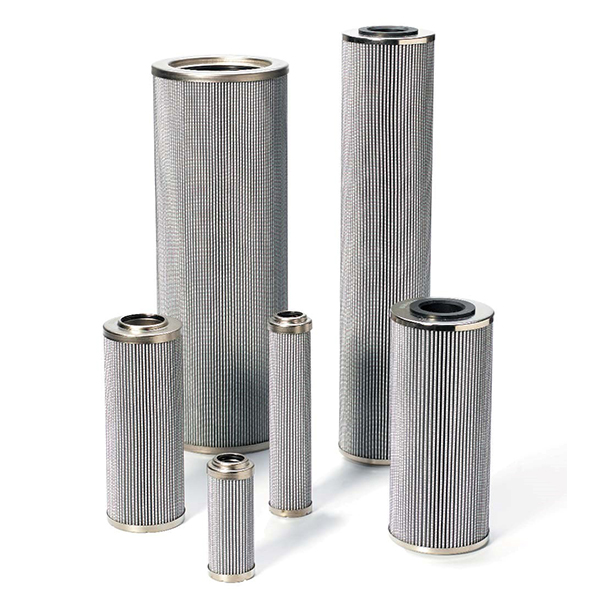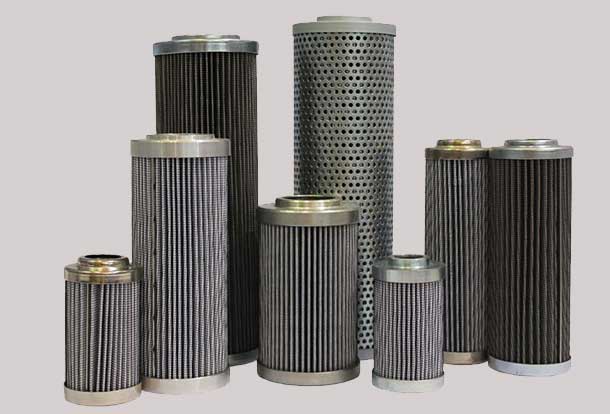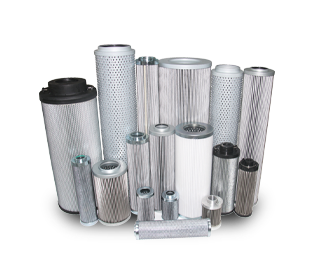In the wind power industry, efficient filtration systems provide a very important solution for optimizing machine performance, reducing equipment failures, protecting its key components, and reducing maintenance costs. Here are some more detailed applications of filtration systems in the wind power industry:
1. Wind power gearbox filtration system: For wind power turbines, the gearbox is a crucial component in the generator set. Precise components such as gears and bearings require high-quality lubricating oil to ensure smooth operation. The gearbox filter system is designed to ensure the smooth operation of this part. This system circulates and filters the lubricating fluid to remove possible harmful impurities, including tiny wear products of gears and bearings, or other particles suspended in the oil. This process can avoid problems such as scratches caused by impurities in the oil, reduced bearing life, and impact on transmission efficiency.
2. Wind power lubricating oil filtering device: Lubricating oil ensures that wind turbines can operate smoothly under various environmental conditions and is the key to maintaining stable performance. This requires special equipment to regularly filter the lubricating oil to remove impurities and wear particles in the oil. This equipment not only removes impurities from the oil, but also cools the lubricating oil to keep the lubricating oil running at its best.
3. Filtration of the generator lubrication system: Because the generator of the wind turbine is located at the top of the turbine and operates at a high speed, it generates a large amount of heat during operation. The filtration equipment of the lubrication system plays an important role here. High-quality filter elements can effectively ensure oil cleanliness, reduce bearing wear and corrosion, and improve the reliability of electro-hydraulic servo systems, thereby significantly improving the operating efficiency of wind power generation equipment.
4. Cabin air filtration system: Wind turbines operating in a marine environment have to face corrosive factors such as salt and sand in the air, and turbines operating in a land environment also need to be dust-proof. The cabin air filtration system cleans the air entering the cabin, effectively filtering and combating the harsh environment that these wind turbines cannot directly face. Keeping the cabin environment clean can minimize the wear and tear of impurities on equipment and extend the service life of wind power equipment.
5. Filtration device of offshore wind power energy storage system: For offshore wind power turbines, in addition to dealing with conventional problems, since they operate in a special marine environment, they must also face a more challenging problem: seawater corrosion. Seawater can corrode metal surfaces, thereby accelerating wear and tear on equipment. Offshore wind power energy storage systems require equipment to filter salt and impurities in seawater to reduce the impact of these factors on battery performance.
Filtration systems in the wind power industry play an important role in these and many other aspects, effectively maintaining stable operation of turbines under unpredictable weather conditions. In general, the application of filters in the wind power industry is very common and very important. In the future development of the wind power industry, its importance will only become more and more prominent.

In the wind power industry, oil filters play a vital role, and their use history deeply penetrates the entire wind power supply chain and production process. Below we analyze each application field of oil filter elements in the wind power industry one by one.
1. Oil filtration of turbine hydraulic system: The wind turbine hydraulic system is a core component for the stable operation of the equipment. The quality of the hydraulic oil is crucial to the operation of the hydraulic system, which means that the hydraulic oil must not have any form of impurities in it. The task of the oil filter element is to remove impurities and particles in the hydraulic oil, ensure the cleanliness of the hydraulic oil, and thus maintain the normal operation of the hydraulic system. In addition, oil filters have another important function, which is to protect hydraulic pumps and other hydraulic components from wear particles, thereby extending the life of the equipment.
2. Filtration of gearbox lubricating oil: The gearbox plays a vital role in wind power generators. It needs to be cooled and lubricated by lubricating oil to ensure its stable operation. Small particles or tiny metal fragments in the lubricant can cause damage to the gearbox. These tiny particles can come from natural wear of the gears or even residue left over from the manufacturing process. Therefore, an oil filter element needs to be installed in the gearbox to remove these tiny impurities suspended in the lubricating oil to prevent them from wearing the gears and bearings, thereby ensuring the stable and reliable operation of the gearbox.
3. Filtration and cooling of wind power lubricating oil stations: When lubricating oil is circulated in wind power equipment, its temperature will gradually increase. This accumulation of heat may cause damage to the stability of the lubricating oil and may even affect the equipment's performance. safe operation. Therefore, wind power equipment needs to be equipped with filter cooling devices to prevent overheating problems. Filtering tiny impurities in the cooling lubricating oil and controlling its temperature can ensure that the lubricating oil always runs in the best condition. This process is completed through the filtration cooling device, in which the oil filter element plays a key role.
4. Intelligent and adaptive filtration technology: With the progress of the wind power industry, its demand for filter element technology is becoming increasingly stringent. Modern oil filters are no longer just simple filtering equipment, but have begun to be manufactured using new materials and new technologies, making the filter elements intelligent and capable of adapting to the environment. For example, some new filter elements now available can automatically adjust the filtration efficiency according to environmental conditions, or are specially designed to have a longer service life. These allow the filter elements to better meet the needs of the wind power industry.
In general, choosing a suitable oil filter element and using it properly can effectively ensure the quality of lubricating oil, improve the operating efficiency of wind power equipment, reduce the occurrence of failures, thereby greatly improving maintenance efficiency and reducing maintenance costs. Therefore, oil filters play an important and irreplaceable role in the wind power industry. As the wind power industry has increasingly higher requirements for environmental protection and sustainability, as well as the continuous advancement of technology, future oil filters will have higher filtration accuracy, better performance, and longer service life to meet the needs of wind power The evolving needs of the industry.

When wind turbine platforms, gearboxes and other equipment are in operation, tiny particles and impurities produced by equipment friction may be mixed into the lubricating oil, and these tiny particles and impurities may cause wear to the internal parts of the equipment, or Interfering with the normal operation of the equipment, an oil filter is required to remove these particles and impurities. Below we will introduce the filtration working principle of the oil filter element in detail.
1. Oil entry: When the equipment starts running, due to the push of the hydraulic impact pump, unfiltered oil will flow through a specific pipeline and eventually enter the outer wall of the filter element. In this process, the speed and direction of oil flow are controlled by the hydraulic impact pump. At the same time, the flow rate and pressure of oil entering the filter element are determined by the operating status of the pump and the working conditions of the equipment.
2. Filtration process: After the oil enters the filter element, it begins to flow to the inside of the filter element. The filter element is composed of an internal metal skeleton and external filter paper or fiber filter material. These filter materials have many pores. When the oil passes through these pores, the pollutants in the unfiltered oil will be intercepted or adsorbed by the filter material and remain in the filter material. into the pores of the filter material, and the clean oil will pass through the filter material.
3. Oil output: The filtered oil will flow out from the inside of the filter element and then return to the hydraulic system to be resupplied to the equipment. During this process, if the pressure in the filter element is too high, the bypass valve inside the filter element will automatically open, allowing part of the unfiltered oil to bypass the filter element and return directly to the hydraulic system to prevent equipment shutdown due to filter element blockage. It should be noted that in this case, a new filter element must be replaced in time to prevent unfiltered oil from entering the equipment.
4. Continuous filtration: During the continuous operation of the equipment, the oil will continue to pass through the filter element for filtration. The filter element will simultaneously bear the pressure from the oil and the suction flowing out from the inside of the filter element, and this process will continue until The filter element is completely clogged or needs to be replaced.
5. Filter element replacement: After the filter element has been working for a period of time, due to the accumulation of impurities in the pores of the filter material, a large pressure difference will occur, resulting in a reduction in the filtration efficiency of the filter element and a decrease in flow rate. At this time, a new filter element needs to be replaced. Nowadays, the filter element has a pressure gauge indicating the pressure difference. When the pressure difference of the filter material reaches the set value, the pressure indicator will send out a signal to prompt the user to replace the filter element with a new one.
Through the above steps, we can understand the working principle of the oil filter element, which is to use the pressure of the oil itself to intercept or adsorb impurities through the filter material, and the clean oil returns to the system through the interior of the filter element and is supplied to the equipment again. . Although this process seems simple, it plays a key role in the normal operation of the equipment, preventing early wear and tear of the equipment, and improving the efficiency of the equipment.

The oil filter element plays a vital role in the equipment. It can protect the parts inside the equipment from wear and tear from impurities in the oil, and improve the working efficiency of the equipment. Here is a detailed explanation of how oil filters affect equipment operating efficiency:
1. Ensure the smooth operation of equipment: In some heavy equipment, such as wind turbines, hydraulic equipment and gear boxes, the role of oil filters is very obvious. During the operation of these equipments, oil circulates through the parts to lubricate and cool them. Unfiltered oil may contain particles of varying sizes and metal debris. During the oil circulation process, if these impurities cannot be effectively filtered, they will not only cause wear to the internal parts of the equipment, but may also block the oil passages and affect the flow of lubricating oil, which will hinder the smooth operation of the equipment. A high-efficiency oil filter element can effectively filter these impurities, keep the oil circuit smooth, and maintain the stable operation of the equipment.
2. Improve the operating efficiency of the equipment: The effective filtration capacity of the filter not only affects the lubrication and cooling effects, but also indirectly affects the operating efficiency of the equipment. A good oil filter can effectively clean the impurities in the oil to maintain the cleanliness of the oil. Clean oil is conducive to the effective lubrication and cooling of equipment, reducing the probability of equipment failure during operation, thus improving the efficiency of equipment.
3. Extend the service life of equipment: Frequent equipment maintenance is a big interruption to production. Production sites need to minimize downtime to maintain productivity. Using high-quality filter elements can reduce the wear of equipment parts, reduce the failure rate of equipment, and help extend the service life of equipment.
4. Reduce maintenance and operating costs: The initial cost of purchasing a high-quality oil filter element may be relatively high, but in the long run, it can save a lot of maintenance costs. Equipment failure due to filter element failure will result in equipment repair costs and downtime costs, which are much higher than the cost of the filter element. A high-quality filter element has a long service life, strong pressure-bearing capacity, and is not easy to break. Therefore, it can reduce the number of filter element replacements and reduce the operating costs of the equipment.
5. Environmental protection and energy optimization: Clean oil reduces the heat and noise of the equipment, optimizes energy use, and reduces useless energy loss. It is positive for reducing noise pollution, improving the working environment, protecting the environment, and achieving green production. promotion effect.
Therefore, the oil filter element can effectively optimize the quality of lubricating oil, reduce the wear of equipment parts, improve equipment performance, improve equipment working efficiency, and protect the normal operation of equipment. In actual operation, the corresponding filter element must be selected based on the type of equipment, working environment, frequency of use and other factors, and the filter element must be replaced regularly to ensure the filtration performance of the filter element. Only then can the positive impact of the filter element on equipment performance and work efficiency be exerted.
The main materials of oil filter elements are as follows:
1. Stainless steel braided mesh filter element: Made of woven stainless steel wire, it has high strength and good toughness. This kind of filter element is suitable for various harsh environments, including high temperature and highly corrosive environments. It can prevent corrosion caused by long-term contact with chemicals such as acids, alkalis, and salts. It is durable and has a long life. In addition, the cleaning of the stainless steel braided filter element is very simple. It only needs to be cleaned repeatedly using appropriate cleaning methods and tools, and it can be restored to the original condition after cleaning, which effectively reduces the cost of use.
2. Fiber paper filter element: It is mainly composed of natural cellulose or synthetic fiber. It is light in weight and has high filtration accuracy. It can filter out tiny impurities and particles in the oil. The fiber paper filter element has good flexibility and air permeability, and is more resistant to the impact of high pressure than similar products. However, the fiber paper filter element is relatively fragile and cannot be used in harsh working environments. It has poor adaptability to high temperatures and highly corrosive liquids.
3. Stainless steel filter element: The main material of this filter element is stainless steel mesh. Its main difference from the stainless steel braided mesh filter element is that its structure is stronger and more stable. The stainless steel filter element has high filtration precision and can filter out larger particles of impurities. It is also very resistant to high temperatures and chemical corrosion, making it a very durable filter material.
4. Ceramic filter element: Ceramic filter element is mainly made of unique ceramic material, with smooth surface, even distribution of holes, and remarkable filtration effect. It can work permanently in high temperature and high pressure environments and has strong resistance to various corrosive substances. At the same time, the ceramic filter element has high cleaning efficiency and can be reused, reducing operating costs.
5. Glass fiber filter element: The glass fiber filter element is a high-efficiency filter material, which is composed of thousands of fine glass fibers interwoven and has a large filtration area. The glass fiber filter element can effectively remove tiny impurities and particles in the oil, with high filtration accuracy and long service life. At the same time, because fiberglass materials have the characteristics of high temperature and heat resistance, they are very suitable for equipment that need to work in high temperature environments.
6. Synthetic fiber filter element: The synthetic fiber filter element is made of high-tech synthetic fiber. This material has high filtration efficiency, especially the filtration performance of large impurities is very superior. However, for tiny particles, the filtration effect of synthetic fiber filters is relatively weak. Therefore, this kind of filter element is more suitable for occasions where the oil cleanliness is not too high, but does not contain tiny particles and impurities.
7. Wood pulp filter paper filter element: Mainly made of wood pulp, this filter element is quite suitable for some general oil purification equipment. Although its filtration accuracy is moderate, the effect is quite good when used in some situations that do not require high oil quality. At the same time, it is also the cheapest of all filter element types.
8. Iron mesh filter element: This filter element is made of iron mesh and is a type of metal filter element. Unlike stainless steel filters and stainless steel woven meshes, iron woven mesh filter elements have relatively poor adaptability to the working environment and cannot withstand high temperatures and corrosive environments. However, its cost is low, so it is often used in low-end equipment that requires replacement of filter elements in large quantities.
The above describes the advantages and disadvantages of oil filters made of various materials, as well as their respective usage environments. In practical applications, the most suitable oil filter element needs to be selected based on the actual requirements of the equipment and the working environment and other factors.








